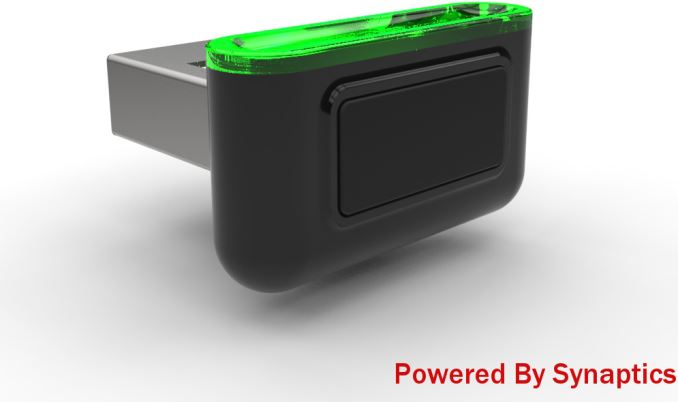Synaptics to Add Inexpensive Fingerprint Reader to Any PC
by Anton Shilov on June 2, 2016 10:00 AM EST- Posted in
- Computex_2016
- Synaptics
- Trade Shows
- Security
- Fingerprint

The importance of biometric authentication is growing these days because passwords, which are easy to remember, are usually not strong enough, whereas complex passwords are hard to remember and enter. While many new mobile devices feature fingerprint reader and some even have an iris scanner, there is a fleet of legacy PCs that do not support any biometric sensors. Synaptics has developed an inexpensive USB dongle, which can add a fingerprint scanner to any PC. The company will offer the device to its customers later this year.
The Synaptics fingerprint USB dongle is based on the company’s Natural ID technology that relies on capacitive touch sensing and SentryPoint security features. The device is small enough to remain unremarkably installed in a USB port, hence, users will not have to carry it separately. Synaptics calls its dongle “Turnkey USB Fingerprint Solution”, but does not disclose the model of its sensor used by the device, or the encryption type supported by the product because there will be several types of dongles with different feature-set.
Synaptics’ latest fingerprint solutions support AES 256-bit encryption, but keep in mind that the scanners and supporting software never store the full image of a fingerprint and support a number of security layers. The hardware and software work together to take an abstract of a fingerprint in a propriety format (using a proprietary alghorithm) and then encrypt this data. Even if the abstract is decrypted, it would be impossible to reconstruct a fingerpritnt. The only security-related information that Synaptics discloses about the dongle is that it is certified by FIDO (Fast IDentity Online) and is compatible with Windows Hello and Microsoft Passport (i.e., Microsoft Windows 10 operating system only).
The USB fingerprint scanner is a finished, ready-to-use device, which Synaptics will offer to partners, who will then be able to either bundle them with their computers or simply resell them to interested parties under their brands. Pricing of the device will depend on exact configurations of the hardware, but should be "well below $50", according to Synaptics.
Synaptics is demonstrating its USB fingerprint scanner at Computex this week, plans to sample the product in Q3 and start to sell them in Q4.
Source: Synaptics















45 Comments
View All Comments
euskalzabe - Thursday, June 2, 2016 - link
That seems quite expensive. I bought my USB fingerprint reader dongle from K-Byte on Amazon for $12 and it works wonders with Windows Hello. I don't see the need to pay $50 for Synaptics' version.BrokenCrayons - Thursday, June 2, 2016 - link
Has Microsoft disclosed how much biometric information they retain once its submitted to the OS? It's probably just paranoia, but I have a hard time trusting the company to do the right thing these days with either image information, microphone audio, and fingerprint patterns. Sure most of that can't be used now, but will that always be the case?Solidstate89 - Thursday, June 2, 2016 - link
It's handled just like Apple and kept only on the local machine. It doesn't require it, but it is also recommended that any use of Hello is in conjunction with a TPM - preferably 2.0. I think it might actually be an OEM requirement, even if it isn't a software requirement.rahvin - Thursday, June 2, 2016 - link
Under no circumstance should biometric information EVER be used for authentication. Biometrics should only be used for identification (Login), never password. Biometric information is trivial to steal. If you make your fingerprint your password you are leaving your password on every single thing you touch.Until these readers and the software they use are configured to use the biometric information only as an identity (login) they are utterly worthless.
xthetenth - Saturday, June 4, 2016 - link
Fingerprints are pretty bad, but other forms are harder to get and harder to duplicate. Meanwhile passwords suck aggressively. I'd agree that it shouldn't be used as a single factor, but a good second or third factor is desperately needed.rahvin - Tuesday, June 7, 2016 - link
There is no biometric data that can't be gathered. They've demonstrated capturing retnal imprints with high resolution digital photography. Facial unlocks can be fooled by photographs. To read a palm vein print all they would need is an camera with the sensitivity to pick up blood vessels. There isn't a single biometric that you could come up with that someone else couldn't capture unless you locked yourself in a basement and never went anywhere. Every single biometric technology in use right now has been broken with often ridiculously simple capture methods.NtAbs2000 - Tuesday, June 7, 2016 - link
Plus,Courts/Enforcements can get an order for you to give up your finger prints, but not a password!
tuxRoller - Thursday, June 2, 2016 - link
I guess you missed the part about it costing "well below $50". I'd imagine around $35, or so. Additionally, it's apparently small enough so you can leave it in the port. That's not so easily done with the K-Byte, judging from the pictures.Lastly, hopefully, it's using a better sensing system. Perhaps something similar to qualcomm's (which, btw, where the hell is that actually being used?).
satai - Thursday, June 2, 2016 - link
Linux compatibility?Samus - Thursday, June 2, 2016 - link
My thoughts exactly. If this is going to gain traction in the enterprise it will need Linux (and likely, by inheritance, OSX) compatibility. Synaptics is usually ok with cross platform support though so I suspect it will be there.This is a cool idea, but considering it is a USB device and not low level like a TPM means it really isn't much more than a password displacement device. Which means targeting the enterprise probably isn't going to be a huge priority.